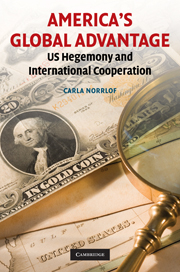Book contents
- Frontmatter
- Contents
- List of figures
- List of tables
- Preface
- Acknowledgments
- 1 Introduction
- 2 The forms and consequences of hegemonic leadership
- 3 Cooperation under hegemony
- 4 International trade cooperation
- 5 Interactive effects between monetary and commercial power
- 6 The security card
- 7 Credible threats and regional competition
- 8 Conclusion
- References
- Index
7 - Credible threats and regional competition
Published online by Cambridge University Press: 19 May 2010
- Frontmatter
- Contents
- List of figures
- List of tables
- Preface
- Acknowledgments
- 1 Introduction
- 2 The forms and consequences of hegemonic leadership
- 3 Cooperation under hegemony
- 4 International trade cooperation
- 5 Interactive effects between monetary and commercial power
- 6 The security card
- 7 Credible threats and regional competition
- 8 Conclusion
- References
- Index
Summary
Given the economic advantages enjoyed by the United States under existing arrangements, why don't other states try to initiate change to gain some of these advantages for themselves? The purpose of this chapter is to explore what sorts of developments would have to take place to challenge American hegemony and how likely it is that these will occur.
The first question to address is at which point allies will start to view American hegemony as a liability. Although the hegemon has a license to act unilaterally – refusing to sign on to international agreements such as the Kyoto Protocol, and the International Criminal Court, and even to circumvent the Security Council – a superpower that is too cavalier gathers resentment. Dissatisfaction in one area may well percolate into other areas. The further apart the United States and allies are politically, the less attractive American product and capital markets will seem. Bush era policies – the war on terror, and Guantanamo Bay, constituting the most unpopular examples – transformed the United States into a military target, and unwittingly risked severing the positive link between securing and attracting foreign investment.
The second question deserving attention is whether allies have a sufficiently strong fallback position to make withholding support of American hegemony rational. When allies turn away from American hegemony, to whom will they turn instead? In the 1980s, we had Japan and a fairly decentralized regional grouping in Europe. Today, amalgamation in East Asia and Europe is producing alternative power structures, and China shows all the signs of wanting to rule the world, though not yet having the capacity.
- Type
- Chapter
- Information
- America's Global AdvantageUS Hegemony and International Cooperation, pp. 192 - 246Publisher: Cambridge University PressPrint publication year: 2010



